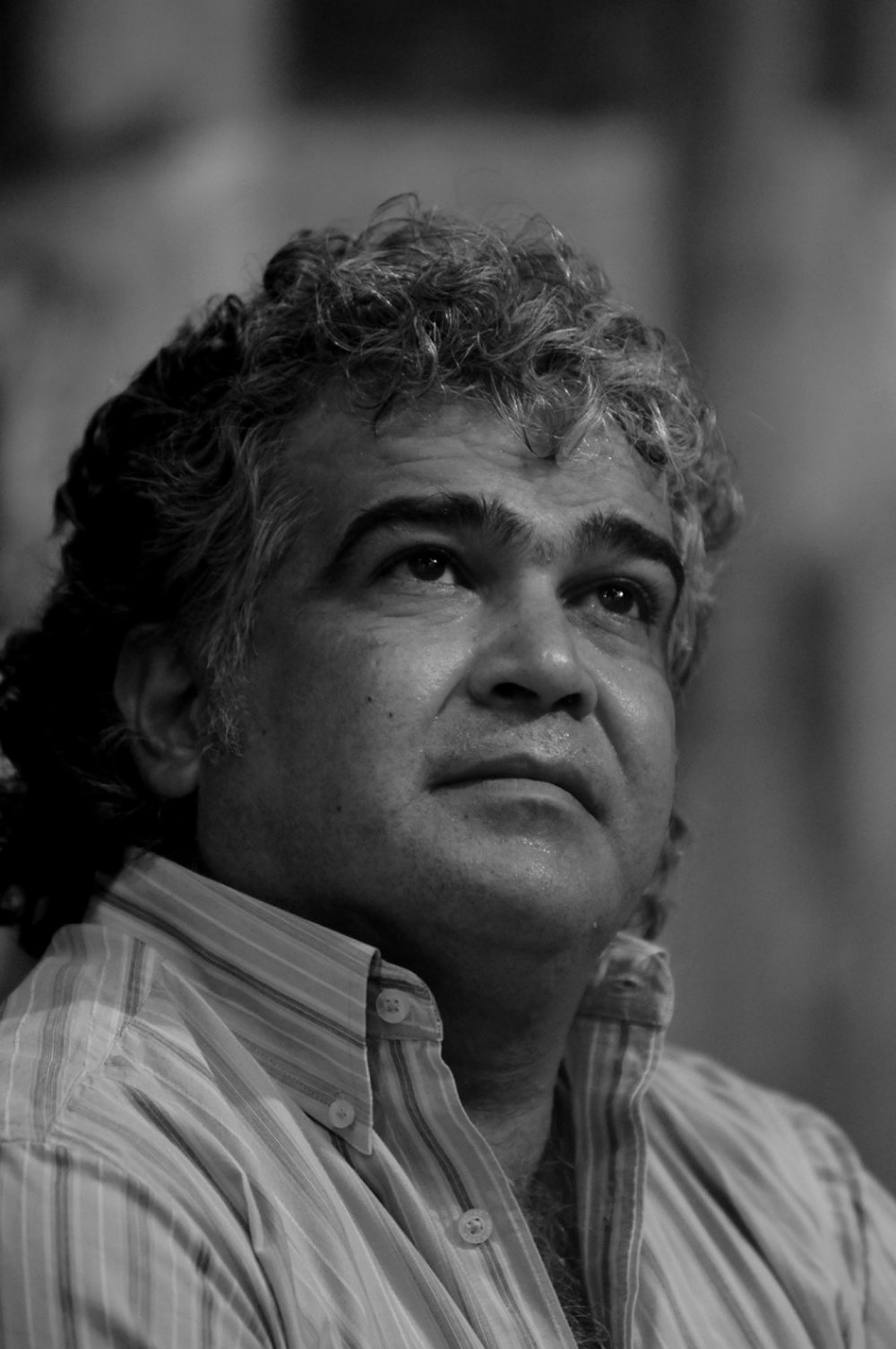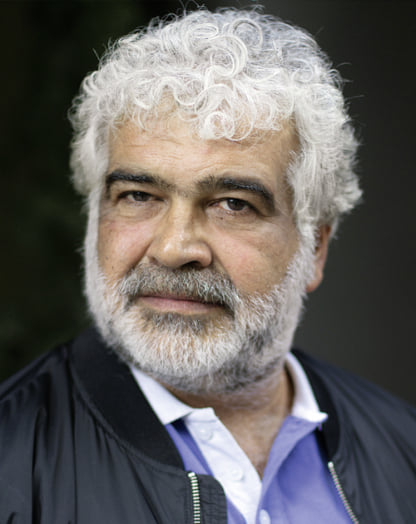
Khaled's Biography
Khaled Khalifa was born on January 1, 1964 in the village of Urm al-Sughra near the city of Aleppo, his family originates from the village of Maryamin in the Afrin region of the Aleppo governorate.
Khalifa’s family is engaged in olive cultivation, and the production of olive oil, as well as in the trade of spare parts for trucks, cars and agricultural machines. He is the fifth child in a family of nine boys, four girls, two mothers, and a father who worked as a policeman until he retired in 1965. He studied in the city of Aleppo, where his family then resided, and graduated from Al-Mutanabbi High School in 1982. He continued his studies at the University of Aleppo and graduated from the Faculty of Law in 1988.
Khalifa began his literary activity at fifteen, as a poet, when he published his first poems in the Al-Thawra (“Revolution”) newspaper, and took part in the University of Aleppo Forum, one of the most famous literature festivals in Syria. This celebration attracted a large audience of students and city folks, before the authorities closed it down in 1988, under the pretext that leftist opposition politicians used its platform to publicize their ideas.
Khaled Khalifa began writing novels at the age of twenty, and continued writing poetry as a way to exercise his language skills. He finished his first novel as a university student, but destroyed it immediately. That novel, he then felt, heavily borrowed other authors’ voices. He thus began the quest for his own literary voice. In 1990, soon after graduating and completing his military service in Damascus, he stopped drawing and writing poetry, devoting himself completely to novels and screenplays.
An active founder of the Alef literary magazine, which focused on new emerging voices and writing styles, Khalifa published a chapter of his first novel, “The guardians of treachery”, in the magazine’s first issue of January 1 st , 1990. The novel itself was published by “Alef magazine publications” in Beirut, in 1993. Similarly, in 1993 Alef published the first chapter of what would become his third novel, “In praise of hatred”. The magazine was closed down by the authorities in the same year.
The period spanning from 1993 to 1998 in Aleppo was very difficult. Khalifa had no resources, and could not afford his own coffee and cigarettes. He was in constant disagreement with his family, who kept asking him to give up writing and work in law or in family projects. In 1999, his first screenplay “The story of Al-Jalali” was released as a TV series directed by one of the greatest Syrian directors Haitham Hakki. The series achieved an overwhelming success. It was followed shortly after, in 2001, by another successful TV series, “Rainbow”, which was also directed by Haitham Hakki, and by “City folks”, directed by Bassam Saad. In 2009, another of his screenplays was released as a series with great success: “Relative quietness”, which tackled the experience of Arab journalists in the Iraq war of 2003, directed by the Tunisian Chawki Mejri. Khalifa wrote many more TV screenplays that all found a very large audience.
In 1998, Khalifa moved permanently to Damascus, where he still lives. He published his second novel, “The notebooks of the Bohemians” in 2000 in its first edition by Dar Ward, (last edition by Hachette Antoine, 2019).
Thirteen years after starting this project, Khalifa finally published “In praise of Hatred” in 2006 (Hachette Antoine, 2019). This novel is the first to ever tackle the difficult and dangerous topic of Hafez El Asad’s bombing of the town of Hama in the early 1980’s, in an effort to eradicate the Muslim Brotherhood. The novel was on the shortlist of the first edition of the International Prize of Arabic Fiction (or Arabic Man Booker) in 2008. It was also shortlisted to the Independent International Award in 2013, and was listed in 2014 by List Muse as one of the best one hundred novels in history. Translated in many languages, “In praise of hatred” established Khalifa’s name internationally.
As peaceful demonstrations started in Syria in 2011, and from its very first moments, Khalifa stood with the Syrian revolution and the rightful demands of the Syrian people. Despite the harassment and the travel bans he was subjected to, or the physical assault that led to his arm being broken in one of the protests, Khalifa remains an outspoken defendant of the Syrian cause, and, to this day, continues to write at each opportunity, about the Syrians’ dream of democracy and freedom in international outlets.
In 2013, “There are no knives in the kitchens of this city” (Hachette Antoine 2018) was published. This ode to Aleppo won the prestigious Naguib Mahfouz Medal of Literature in 2014, awarded by the American University in Cairo. Again, the book was shortlisted to the International Prize of Arabic Fiction that same year. The novel also gained world-wide attention, and was widely translated.
In 2016, “Death is Hard Work” was published by Hachette Antoine in Beirut (Dar Al Ain in Cairo). This road novel eloquently depicts the absurdity of the Syrian war, and was a finalist to the National Book Award 2019, in the foreign literature category. In 2020, the novel also won the Saif Ghobash-Banipal Award for Translation. Khalifa’s last novel, “No one prayed over their graves”, was published in 2019.
Returning to the topic of Aleppo, this epic novel centered on the theme of redemption, describes the transformation of the city at the turn of the twentieth century, and reveals its complex cosmopolitan identity. In 2022, Khalifa published his first memoire, a collection of thoughts on writing, “An eagle on the side-table: Diaries of solitude and writing”.
While still devoted to his work on fiction, with his novels translated to more than 20 languages, Khalifa got back to painting with the first days of Covid, and is currently preparing his first solo exhibition.
TV Series Writing
- 2000 Aljalali Family Life Directed by Haytham Hakki
- 2002 The Rainbow Directed by Haytham Hakki
- 2004 Letters Written by the Rain Directed by Fahed Miri
- 2005 The City Residents Directed by Bassam Saed
- 2006 The Last Rose Directed by Fardos Attasi
- 2004 Gray Spaces Directed by Hatem Ali TV Film (90m.)
- 2006 Portraits (On Arab Writers) Presenter/Executive Producer
- 2007 The Time of Fear Directed by Haytham Hakki
- 2007 Shadow of a woman Directed by Nazir Awwad
- 2009 Relative Calm Directed by shawkey al Majery
- 2012 The Key Directed by Hisham Sharbatj
- 2015 Faces and places: The Castle Directed by Haitham Hakki
- 2016 The Godfather: Under the belt Directed by Hatem Ali
Cinema
- 2001 A Descent Evening Directed by Bassam Kousa – Short film (8m).
- 2003 Bab Al Maqam Directed By Mohamd. Malas
- 2005 Al Hajar Al Aswad Directed by Nidal Dibes.
Prizes
- 2000 Best scenario for the serial ” Aljalali Family Life “
- 2002 Best contemporary drama ” The Rainbow “
- 2004 Best scenario for the serial ” Letters Written by the Rain “
- 2008 In Praise of Hatred shortlisted for the Arabic Booker Prize
- 2009 More than ten prizes for the series Relative Calm; candidate for the Emmy Award
- 2013 In praise of hatred long listed for the Independent prize.
- 2013 Naguib Mahfouz Medal for Literature

